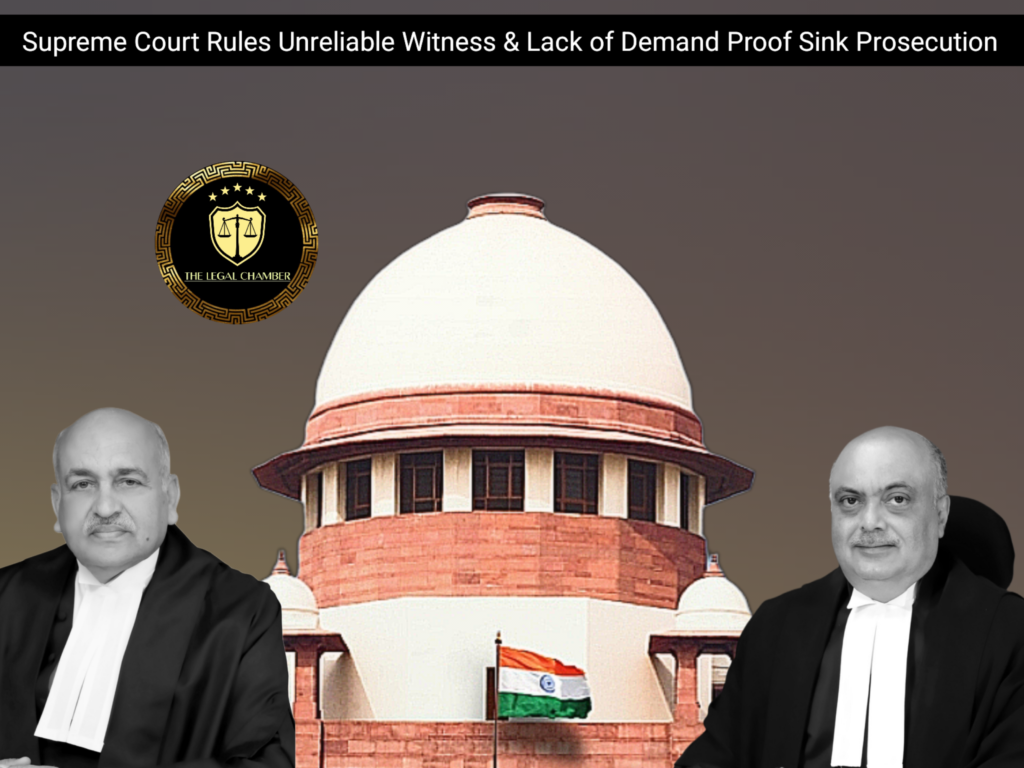
The Supreme Court upheld the acquittal, emphasizing that proving the initial demand of illegal gratification beyond reasonable doubt is essential for conviction under Sections 7 & 13(1)(d) read with 13(2) of the Prevention of Corruption Act, 1988. Mere recovery of tainted money is insufficient; the prosecution failed to conclusively establish demand. The statutory presumption under Section 20 of the Act does not apply when demand is not proven, requiring strict construction of penal provisions.
Facts Of The Case:
C B Nagaraj, the Respondent, served as an Extension Officer in the Taluka Panchayath office, Davanagere. The Complainant, E R Krishnamurthy, sought a Validity Certificate for a teaching post under Category-II A, requiring a spot inspection report from Nagaraj. On February 7, 2007, Krishnamurthy alleged that during a 12:30 PM visit to Nagaraj’s office, Nagaraj demanded Rs. 1,500 as a bribe to submit the report. Krishnamurthy claimed he returned at 5:30 PM the same day and paid the money. The Lokayuktha Police laid a trap; Nagaraj accepted the Rs. 1,500, which consisted of phenolphthalein-coated currency notes. Upon recovery, Nagaraj’s fingers tested positive in a sodium carbonate solution. He defended himself, asserting the money was repayment of a loan he had given Krishnamurthy during the spot inspection on February 5, 2007, not a bribe. The Trial Court (Special Judge, Davanagere, 2011) convicted Nagaraj under Sections 7 and 13(1)(d) read with 13(2) of the Prevention of Corruption Act, 1988, sentencing him to imprisonment and fines. The Karnataka High Court (2013) acquitted him, setting aside the conviction. The State appealed this acquittal to the Supreme Court.
Procedural History:
The case originated with the registration of a complaint by the Lokayuktha Police, Davanagere, against C B Nagaraj (Respondent) under Sections 7 and 13(1)(d) read with 13(2) of the Prevention of Corruption Act, 1988, based on allegations of bribe demand and acceptance on February 7, 2007. After trial, the Special Judge, Davanagere, convicted the Respondent on December 23, 2011, in Spl. C. (Lokayuktha) No. 8/2007, sentencing him to imprisonment and fines. The Respondent appealed to the High Court of Karnataka (Criminal Appeal No. 12/2012), which acquitted him on July 9, 2013, setting aside the Trial Court’s conviction. The State, through the Lokayuktha Police, then appealed to the Supreme Court of India (Criminal Appeal No. 1157 of 2015). On May 19, 2025, a Supreme Court bench comprising Justices Pankaj Mithal and Ahsanuddin Amanullah dismissed the State’s appeal, upholding the High Court’s acquittal and affirming that the prosecution failed to prove the demand of illegal gratification beyond reasonable doubt.
READ ALSO : Supreme Court Rules High Courts CAN Quash DV Act Proceedings Under Section 482 CrPC
Court Observation:
The Supreme Court observed that the foundational element of “demand” of illegal gratification under Sections 7 and 13(1)(d) of the Prevention of Corruption Act, 1988, was not proven beyond reasonable doubt. The testimony of the complainant (PW1) was deemed unreliable due to his initial denial and subsequent admission of the spot inspection report (Exhibit D8) and signatures, indicating mala fide conduct. The Court noted contradictions in the testimony of shadow witness PW2, who failed to consistently corroborate the demand. Critically, the prosecution failed to establish a complete chain linking demand, acceptance, and recovery, as the Respondent had already forwarded the complainant’s file before the alleged bribe exchange, negating the motive for payment. The statutory presumption under Section 20 of the Act was held inapplicable absent proof of demand, per precedents like Paritala Sudhakar (2025). The Court emphasized strict construction of penal statutes and upheld the High Court’s acquittal, ruling that mere recovery of tainted money cannot sustain conviction when demand remains unproven.
Final Decision & Judgement:
The Supreme Court dismissed the State’s appeal and upheld the Karnataka High Court’s acquittal of Respondent C B Nagaraj. The bench affirmed that the prosecution failed to prove the essential element of “demand” of illegal gratification under Sections 7 and 13(1)(d) read with 13(2) of the Prevention of Corruption Act, 1988, beyond reasonable doubt. Mere recovery of tainted money could not sustain conviction, as the statutory presumption under Section 20 of the Act was held inapplicable absent proof of demand. The Court found the complainant’s testimony unreliable due to material contradictions regarding the spot inspection report, and noted the absence of a complete chain of evidence (demand-acceptance-recovery). Consequently, the acquittal was confirmed, and no costs were awarded.
Case Details:
Case Title: State of Lokayuktha Police, Davanagere vs. C B Nagaraj Citation:2025 SCC OnLine SC 736 Criminal Appeal No.:Criminal Appeal No. 1157 of 2015 Date of Judgment:May 19, 2025 Judges/Justice Name: Justice Pankaj Mithal & Justice Ahsanuddin Amanullah
Download The Judgement Here